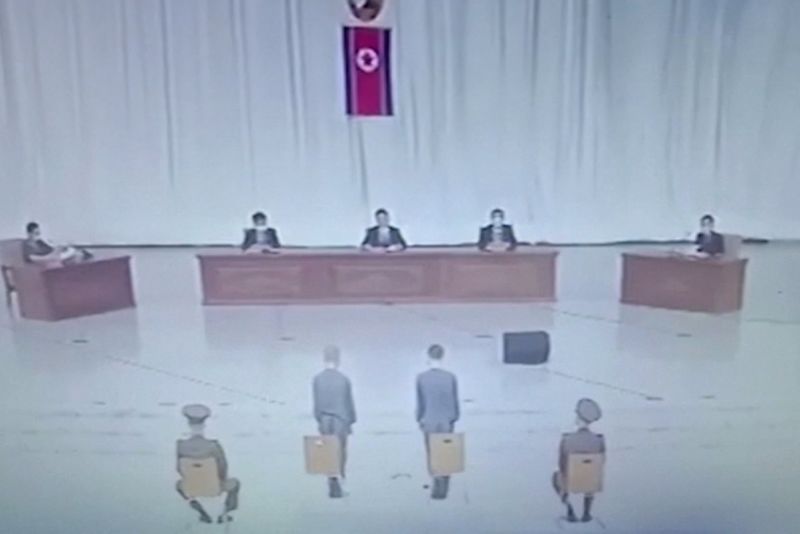
The Cultural Crackdown in North Korea

A look into the strict ban on South Korean culture in North Korea and the consequences faced by those who violate it.
The Crackdown on South Korean Culture
North Korea, often referred to as the hermit nation, has maintained a strict ban on South Korean cultural content, including movies, TV shows, and music. The recent release of rare footage by a South Korean research group sheds light on the severe consequences faced by North Korean teenagers who are caught watching and distributing K-dramas, which are banned in the country. The footage depicts a public trial where two teenagers were sentenced to hard labor for their involvement in the consumption and distribution of South Korean entertainment. This crackdown is a clear indication of the North Korean regime's fear of its population being exposed to outside cultural influences.
The video shows the teenagers facing a panel on a stage in an ampitheater.
The narrated footage, released by the Seoul-based South and North Development Institute (SAND Institute), shows the teenagers standing on a stage in an amphitheater, surrounded by hundreds of people wearing white shirts, presumably students. Flanked by adults in military-style uniforms, the teenagers face a panel of authorities seated at tables to the rear of the stage. The video, obtained and distributed by the SAND Institute, reveals the extent to which the North Korean government goes to hold individuals accountable for consuming and spreading foreign cultural content.
The Consequences and Restrictions
The severity of the consequences faced by the teenagers is staggering. Each of them was sentenced to 12 years of hard labor, despite being only 16 years old at the time. The narrator in the footage highlights the impact of foreign culture on the teenagers, lamenting the ruin of their future paths. Additionally, the video displays the names of the teenagers' homeroom teachers, further emphasizing the regime's intention to shame and hold individuals accountable for their actions. The strict ban on foreign materials, including movies and books, has been a longstanding policy in North Korea, with severe punishment awaiting those caught with contraband. The recent resurgence of strict rules and a crackdown on foreign media indicate the regime's heightened vigilance in curbing any influence from South Korean pop culture.
The Reach of the Ban
Beyond the prohibition of entertainment, North Korea's ban on South Korean culture extends to the regulation of mannerisms, vocabulary, and even hairstyles. The implementation of the 'Anti-reactionary Ideology and Culture Act' in 2020 further solidified the restrictions, with severe penalties for the distribution, watching, or listening to any South Korean cultural content. The act, displayed in the footage, serves as a stark reminder of the regime's control over the daily lives of its citizens. In addition to entertainment, the ban encompasses everyday behaviors and language, with strict rules on attire, vocabulary, and even terms of endearment. The impact of these restrictions extends beyond the realm of entertainment, shaping the very fabric of social interactions and personal expression within North Korean society.














